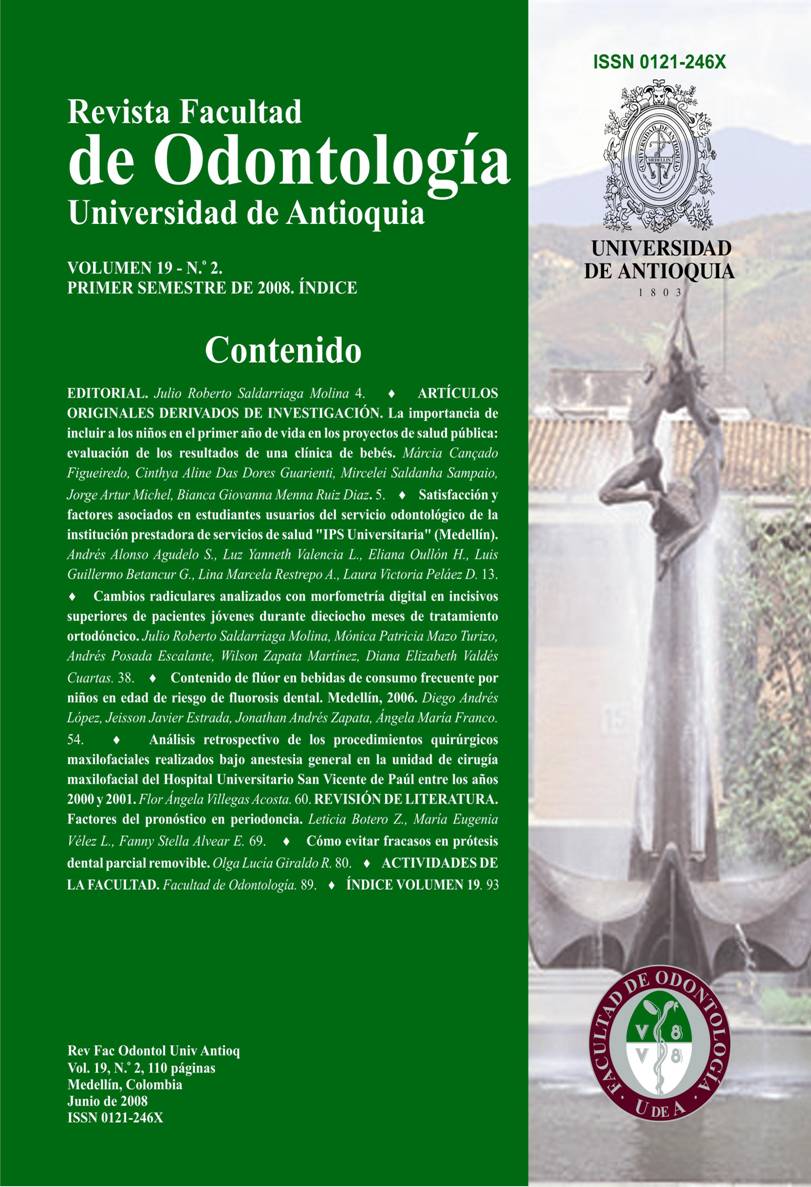Cómo evitar fracasos en prótesis dental parcial removible
DOI:
https://doi.org/10.17533/udea.rfo.2231Palabras clave:
prótesis dental parcial removible, fracaso de la prótesis dental, prótesis dentalResumen
Una prótesis dental parcial removible constituye una modalidad terapéutica para restaurar rebordes edéntulos parciales, donde una prótesis parcial fija no está indicada. La prótesis dental parcial removible, aunque es un excelente medio para reemplazar dientes perdidos, puede ser una seria amenaza para los dientes remanentes, por los posibles efectos de palanca que ejerce sobre las estructuras dentarias, cuando no se planea adecuadamente. La preservación de los dientes remanentes y la maximización de la función del sistema masticatorio, son los dos objetivos principales del tratamiento con una prótesis parcial removible. El propósito de esta revisión de literatura es identificar muchas de las causas del fracaso de la prótesis dental parcial removible teniendo en cuenta el beneficio que puede otorgar al paciente cuando otra alternativa no puede ser utilizada.
Descargas
Descargas
Publicado
Cómo citar
Número
Sección
Licencia
El Derecho de autor comprende los derechos morales y los derechos patrimoniales.
1. Los derechos morales: nacen en el momento de la creación de la obra, sin necesidad de registro. Corresponden al autor de manera personal e irrenunciable; además, son imprescriptibles, inembargables y no negociables. Son derechos morales el derecho a la paternidad de la obra, el derecho a la integridad de la obra, el derecho a conservar la obra inédita o publicarla bajo seudónimo o anónimamente, el derecho a modificar la obra, el derecho al arrepentimiento, y el derecho a la mención, según definiciones consignadas en el artículo 40 del Estatuto de propiedad intelectual de la Universidad de Antioquia (RESOLUCIÓN RECTORAL 21231 de 2005).
2. Los derechos patrimoniales: consisten en la facultad de disponer y aprovecharse económicamente de la obra por cualquier medio. Además, las facultades patrimoniales son renunciables, embargables, prescriptibles, temporales y transmisibles, y se causan con la publicación, o con la divulgación de la obra. Para el efecto de la publicación de artículos de la Revista de la Facultad de Odontología se entiende que la Universidad de Antioquia es portadora de los derechos patrimoniales del contenido de la publicación.
Yo, el(los) autor(es), y por mi(nuestro) intermedio, la Entidad para la que estoy(estamos) trabajando, transfiero(imos) de manera definitiva, total y sin limitación alguna a la Revista Facultad de Odontología Universidad de Antioquia, los derechos patrimoniales que le corresponden sobre el artículo presentado para ser publicado tanto física como digitalmente. Declaro(amos) además que este artículo ni parte de él ha sido publicado en otra revista.
Política de Acceso Abierto
Esta revista provee acceso libre inmediato a su contenido, bajo el principio de que poner la investigación a disposición del público de manera gratuita contribuye a un mayor intercambio de conocimiento global.
Licencia Creative Commons
La Revista facilita sus contenidos a terceros sin mediar para ello ningún tipo de contraprestación económica o embargo sobre los artículos. Para ello adopta el modelo de contrato de licenciamiento de la organización Creative Commons denominada Atribución – No comercial – Compartir igual (BY-NC-SA). Esta licencia les permite a otras partes distribuir, remezclar, retocar y crear a partir de la obra de modo no comercial, siempre y cuando nos den crédito y licencien sus nuevas creaciones bajo las mismas condiciones.
Esta obra está bajo una Licencia Creative Commons Atribución-NoComercial-CompartirIgual 4.0 Internacional.














